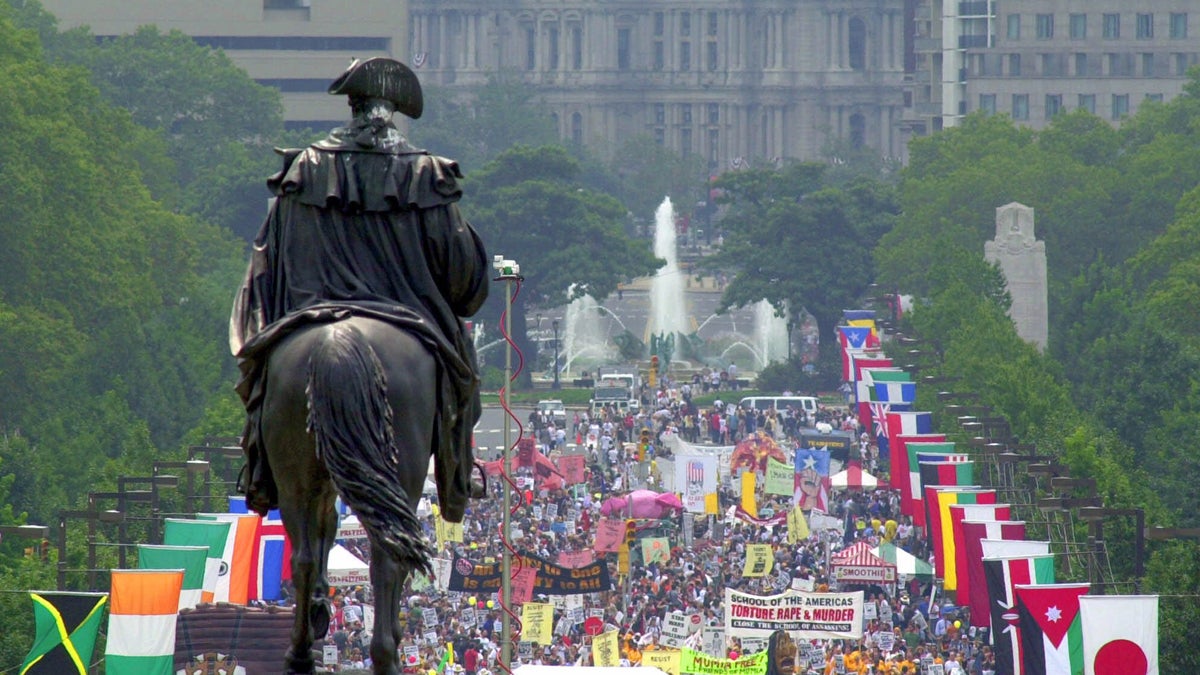Philly police approach to DNC in stark contrast with combative stance during last convention
Listen
Overlooked by a statue of George Washington on a horse
Authorities in Philadelphia learned hard lessons the last time the region hosted a national political convention in 2000.
City officials made hostile statements about protesters before the Republican National Convention event and ended up arresting more than 400 of them.
The legacy of the RNC is looming as officials brace themselves for tens of thousands of demonstrators next week.
Just take Philadelphia Police Commissioner Richard Ross’ response when asked recently whether city police will be wearing riot gear during the convention.
“No, no, no. No, we don’t. We don’t,” Ross said.
You might see law enforcement from Homeland Security, or SWAT team members wearing heavy equipment, but not the vast majority of the hundreds of Philly cops working the convention.
“We will not be outfitting in anything special for the DNC,” Ross said. I mean, it’s going to be soft clothes. We’re going to deal with this just as if it’s a peaceful event.”
Which is not how the RNC in 2000 is typically described, when tensions between protesters and police raged.
Conspiracy theories
In one of the most notorious episodes of the convention, undercover state troopers infiltrated a warehouse in West Philadelphia, where demonstrators were making puppets and floats, known as the Ministry of Puppetganda.
Authorities suspected they were communist-inspired groups that could be dangerous. Specifically, police were worried about marchers using PVC pipes and chains used to create human blockades.
Here’s what then-Deputy Police Commissioner Sylvester Johnson said about the site, when he spoke to WHYY in 2000.
“Their intention was to block all of traffic and stop everything that’s going on and stop the movement and shut down the entire city, which they done in Washington, which they done in Seattle,” Johnson said.
Activist Jodi Netzer helped rent the warehouse, and disputed Johnson’s take.
“That is not true,” Netzer said. “We were making cardboard art, puppetry. That’s the purpose of this space.”
Kris Hermes was on the ground in 2000 as a legal observer. He’s also written a book about the national impact of the police tactics used during the convention.
“Police had raided the warehouse, and arrested 70 people inside and charged them, and put them in jail,” he said.
He said what really emboldened protesters in Philly at the time were anti-globalization rallies happening around the country that resulted in hundreds of arrests after clashes with police.
“The Republican Convention in Philadelphia was preceded by a couple of other major mobilizations. One, in Seattle, at the WTO meetings in 1999, and then, a few months later, the IMF and World Bank meetings in April in 2000 in Washington, D.C..” he said.
Shortly after, during the RNC, around 97 percent of the more than 400 arrests, including those form the puppet warehouse, ended in dropped charges or acquittals.
And if there ever was a sign of a different time, it’s what the Philadelphia District Attorney’s Office charged some of the protesters with: “possession of an instrument of crime” for having a cell phone used to help orchestrate some of marches.
Alleging over-zealous policing, more than a dozen protesters filed civil lawsuits against the city, costing the city tens of thousands of dollars.
This is how Police Commissioner John Timoney described the protesters to WHYY in 2000.
“What we have is, it has become clear to me, are conspirators. There’s nothing else to call them. People that sit around and conspire to come into city after city to cause mayhem, to cause violence against police officers and citizens,” Timoney said.
Sixteen years later, Police Commissioner Ross is striking a different tone.
“We’re not looking to make arrests. That is not our plan,” Ross said. “Obviously of the situation warrants it, then that’s what we’ll do. But only as a last resort.”
Ratcheting down nuisance crime penalties
Ahead of next week’s convention, City Council decriminalized nuisance crimes like disorderly conduct and blocking a highway, now punishable with a $100 civil fine instead of an arrest on criminal charges, which would carry the possibility of jail time.
That’s was applauded by advocates of the protesters. But others aspects of the city’s DNC planning are receiving a harsher assessment.
For instance, the city has purchased special insurance to cover up to $5 million in legal claims of police brutality or excessive force.
The so-called riot insurance is common for big political events. Cleveland, too, took out private insurance this year for police misconduct liability. But civil rights advocates say the practice sends bad signal.
“They have insurance that basically allows them to be deliberately indifferent to the civil rights of individuals,” said Larry Krasner, a Philadelphia criminal defense attorney who represented protesters in 2000 and is keeping an eye on how things shake out this time around.
Police Commissioner Ross says with an event as big and contentious as the DNC, contending with a “level of anarchy” is just about unavoidable.
WHYY is your source for fact-based, in-depth journalism and information. As a nonprofit organization, we rely on financial support from readers like you. Please give today.

